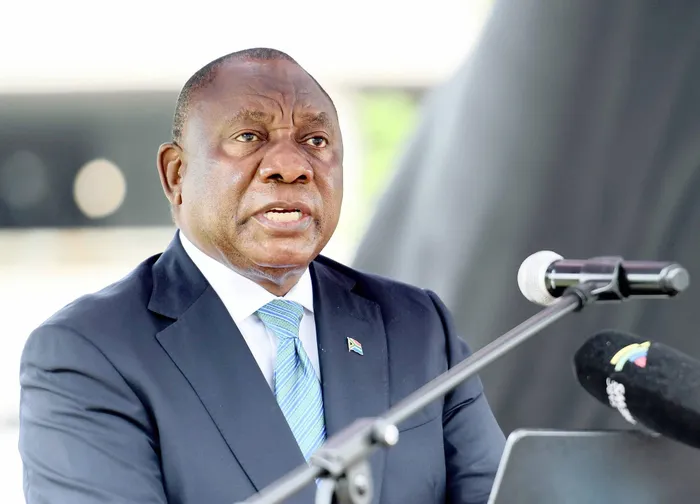Political analyst warns of severe repercussions for South Africa amid DA-ANC tensions

Political analyst had warned President Cyril Ramaphosa that removing the DA from the GNU would have consequences of economic crisis.
Image: Jairus Mmutle/ GCIS
If President Cyril Ramaphosa were to dare to fire the Democratic Alliance (DA) from the Government of National Unity (GNU), the Western powers might jump into action to punish South Africa severely, warns political analyst Zakhele Ndlovu.
Ndlovu, who is from the University of KwaZulu-Natal, commented on the worsening standoff between the ANC and DA since the inception of the GNU.
The DA had begun implementing its threat to frustrate Ramaphosa by rejecting the budget vote for two ANC-led departments, whose ministers it accused of corruption and incompetence.
Among those ministers whom the DA wanted to be fired were Human Settlements’ Thembi Simelane and Higher Education’s Nobuhle Nkabane. The party also wanted Water and Sanitation Deputy Minister David Mahlobo out of the position.
The DA’s demands were sparked by Ramaphosa firing its MP, Andrew Whitfield, as the Trade, Industry and Competition deputy minister, last week.
When Ramaphosa refused to succumb to the pressure, DA leader John Steenhuisen announced a boycott of some of the ANC departments’ budget votes and that the party was pulling out of the National Dialogue.
The DA said the National Dialogue was pro-ANC as Ramaphosa decided without consultation which eminent persons would participate.
Steenhuisen threatened a vote of no confidence against the head of state, who has constitutional powers to appoint and remove members of his Cabinet.
Said Ndlovu: “Ramaphosa won't dare to use his power to fire DA ministers or force the DA to exit the GNU. The DA knows that investors and Western governments are on its side to severely punish the ANC and South Africans.”
Ndlovu called on Ramaphosa to respect the GNU parties because the ANC did not receive the voters’ mandate to govern alone.
Ramaphosa’s spokesperson, Vincent Magwenya, said: “As far as we understand, there's no standoff in the GNU. Parties joined the GNU voluntarily, equally, they'll leave the GNU if they so choose out of their own accord.”
Ndlovu said Ramaphosa’s hands were tied as kicking the DA out would have consequences.
“The economy would be sabotaged, and that would mean higher unemployment, more poverty, and South Africa doesn't want to become another Zimbabwe,” said Ndlovu.
He said the Basic Education Laws Amendment (BELA) Act, the National Health Insurance Act, and the Land Expropriation Act were a result of bullying “as if it (ANC) was still in control of the executive”.
“The ANC no longer has an outright majority and, therefore, needs to compromise to reach consensus with its coalition partners, particularly the DA (because) clearly, the gloves are off now.
“By pulling out of the National Dialogue, the DA hopes to frustrate and punish the ANC for acting as if it still has an outright majority,” said Ndlovu.
Ndlovu said that although the DA felt like an abused partner in a marriage, it does not want the marriage to end because it has more to lose than to gain in a divorce.
“There is no hope to iron out the differences, but to hang in there until the end of the term of office.
“The only way to manage the differences is to keep reminding each other that they need each other. Already, these differences are disrupting the work of the GNU and making it ineffective,” said Ndlovu.
During a media briefing in Cape Town on Saturday, Steenhuisen challenged the ANC when he said: “If the ANC wants to kick the DA out for fighting against corruption, well, so be it.”
Soon after Minister Simelane tabled her R33 billion budget vote in Parliament on Thursday, the DA rejected it.
“We cannot support allocating R33 billion to a department led by a minister implicated in serious corruption. Since President Ramaphosa refuses to act, the DA will take every possible step to prevent further misuse of public funds,” read its statement.
The DA was joined by the uMkhonto weSizwe (MK) Party and the Economic Freedom Fighters (EFF) in rejecting Nkabane’s budget.
DA national spokesperson Willie Aucamp said his party was not opposed to the budget, but to ministers who are handling it “as part of the fight against corruption”.
He said the ANC was not listening to the DA’s input in the GNU.
“The ANC had become used to over 30 years of being in power alone, and it will take time for it to come to terms with the fact that they don’t govern alone anymore.
“President Ramaphosa must have a Cabinet with people fit for the purpose and who are worthy of being members of the Cabinet,” said Aucamp.
He said the parties should stick to the Statement of Intent, which the parties signed before the formation of the GNU, which says that there should be sufficient consensus in the government’s decision.
The ANC questioned the DA’s commitment to the GNU, stating that its vote against the departments’ budget was “not only disruptive but also undermined the very spirit and functioning of the GNU, to which the DA has committed itself”.
“South Africans deserve clarity and leadership guided by national interest, not short-term political expediency,” said ANC national spokesperson Mahlengi Bhengu-Motsiri.
Another political analyst, Sakhile Hadebe, said the DA was trying too hard to prove its existence and visibility in the GNU.
He did not see the ANC voting against the budget of DA-led departments because, as the biggest party in the GNU, the ANC “must lead by example and properly”.
bongani.hans@inl.co.za